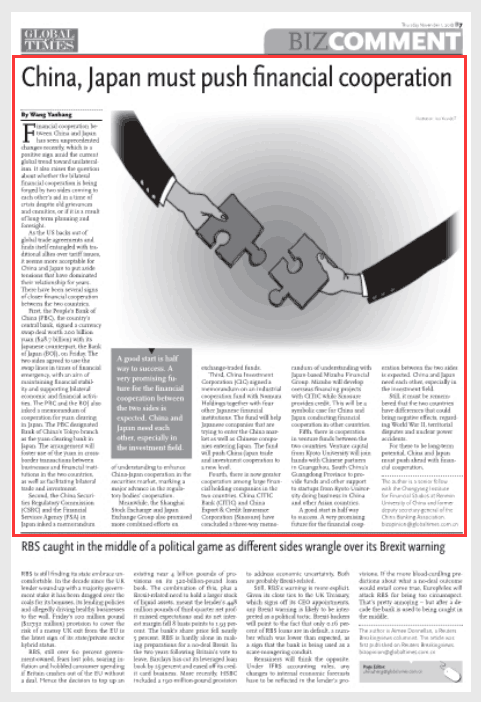Major Power Relations
Your Present Location: PROGRAMS> Major Power RelationsWang Yanhang: China, Japan must push financial cooperation
Financial cooperation between China and Japan has seen unprecedented changes recently, which is a positive sign amid the current global trend toward unilateralism. It also raises the question about whether the bilateral financial cooperation is being forged by two sides coming to each other's aid in a time of crisis despite old grievances and enmities, or if it is a result of long-term planning and foresight.
As the US backs out of global trade agreements and finds itself entangled with traditional allies over tariff issues, it seems more acceptable for China and Japan to put aside tensions that have dominated their relationship for years. There have been several signs of closer financial cooperation between the two countries.
First, the People's Bank of China (PBC), the country's central bank, signed a currency swap deal worth 200 billion yuan ($28.7 billion) with its Japanese counterpart, the Bank of Japan (BOJ), on Friday. The two sides agreed to use the swap lines in times of financial emergency, with an aim of maintaining financial stability and supporting bilateral economic and financial activities. The PBC and the BOJ also inked a memorandum of cooperation for yuan clearing in Japan. The PBC designated Bank of China's Tokyo branch as the yuan clearing bank in Japan. The arrangement will foster use of the yuan in cross-border transactions between businesses and financial institutions in the two countries, as well as facilitating bilateral trade and investment.
Second, the China Securities Regulatory Commission (CSRC) and the Financial Services Agency (FSA) in Japan inked a memorandum of understanding to enhance China-Japan cooperation in the securities market, marking a major advance in the regulatory bodies' cooperation.
Meanwhile, the Shanghai Stock Exchange and Japan Exchange Group also promised more combined efforts on exchange-traded funds.
Third, China Investment Corporation (CIC) signed a memorandum on an industrial cooperation fund with Nomura Holdings together with four other Japanese financial institutions. The fund will help Japanese companies that are trying to enter the China market as well as Chinese companies entering Japan. The fund will push China-Japan trade and investment cooperation to a new level.
Fourth, there is now greater cooperation among large financial holding companies in the two countries. China CITIC Bank (CITIC) and China Export & Credit Insurance Corporation (Sinosure) have concluded a three-way memorandum of understanding with Japan-based Mizuho Financial Group. Mizuho will develop overseas financing projects with CITIC while Sinosure provides credit. This will be a symbolic case for China and Japan conducting financial cooperation in other countries.
Fifth, there is cooperation in venture funds between the two countries. Venture capital from Kyoto University will join hands with Chinese partners in Guangzhou, South China's Guangdong Province to provide funds and other support to startups from Kyoto University doing business in China and other Asian countries.

A good start is half way to success. A very promising future for the financial cooperation between the two sides is expected. China and Japan need each other, especially in the investment field.
Still, it must be remembered that the two countries have differences that could bring negative effects, regarding World War II, territorial disputes and nuclear power accidents.
For there to be long-term potential, China and Japan must push ahead with financial cooperation.
The author is a senior fellow with the Chongyang Institute for Financial Studies at Renmin University of China and former deputy secretary-general of the China Banking Association.























































































 京公网安备 11010802037854号
京公网安备 11010802037854号





